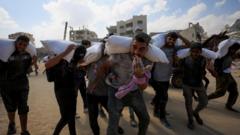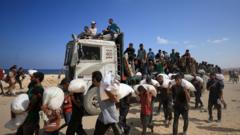The UK, along with 27 countries, has issued a strong statement demanding an end to the ongoing conflict in Gaza, citing severe humanitarian concerns. They assert that Israel's aid delivery practices are endangering civilian lives and perpetuating a dire situation marked by hunger and malnutrition.
UK and 27 Nations Urge Immediate Ceasefire in Gaza Amid Humanitarian Crisis

UK and 27 Nations Urge Immediate Ceasefire in Gaza Amid Humanitarian Crisis
UK leads coalition condemning Israel's tactics as Gaza's suffering escalates, sparking international outrage.
The statement describes the desperation faced by Gaza’s civilians, stating that access to basic needs such as food and water has become perilous. With reports from the Hamas-run health ministry indicating the deaths of over 100 individuals seeking aid just this past weekend, the international call for action is echoing worldwide concerns over the humanitarian crisis unfolding in the region.
In their declaration, the foreign ministers emphasize the urgent need for the war to conclude, labelling the current humanitarian model implemented by Israel as "dangerous" and a violation of human rights. They expressed horror at the continued violence towards civilians, including children, who are simply seeking assistance for basic survival needs.
Since the partial easing of the blockade on aid deliveries, there has been a marked increase in casualties among those attempting to access food and medical supplies. The UN reports that at least 674 Palestinians have been killed near new aid distribution sites over the past couple of months, with instances of fatalities occurring as people flock toward UN aid convoys.
Israel's government has responded sternly to this condemnation, asserting that the international community’s perspective is out of touch with the realities on the ground. They insist that Hamas bears responsibility for the violence and ongoing chaos, accusing the militant group of obstructing genuine aid efforts for its own gain. Israel claims to adhere to international law while facilitating humanitarian assistance into Gaza.
In addition to calling for a ceasefire, the statement rebukes Israel's proposal to relocate Gaza's 2.1 million residents to a designated “humanitarian city,” which it categorizes as a forced displacement in contravention of international laws.
The World Food Programme has sounded the alarm over the escalating hunger crisis, warning that severe malnutrition is threatening thousands of women and children in Gaza. Hospitals across the region have reached critical conditions and are unable to provide food for patients due to shortages of supplies.
The crisis has drawn attention from multiple international entities, raising complex debates about the responsibility of nations engaged in geopolitical conflicts and the ever-important role of humanitarian principles in warfare. As the situation remains tense, these nations express a commitment to pursuing actionable avenues for peace, potentially revisiting discussions on Palestinian statehood in the context of regional stability.
Israeli officials contend that they remain committed to international protocols governing humanitarian assistance, stating that they continue to facilitate aid deliveries in collaboration with various organizations. They maintain that without cooperation from Hamas, achieving peace and security in the region will remain an elusive goal.
In their declaration, the foreign ministers emphasize the urgent need for the war to conclude, labelling the current humanitarian model implemented by Israel as "dangerous" and a violation of human rights. They expressed horror at the continued violence towards civilians, including children, who are simply seeking assistance for basic survival needs.
Since the partial easing of the blockade on aid deliveries, there has been a marked increase in casualties among those attempting to access food and medical supplies. The UN reports that at least 674 Palestinians have been killed near new aid distribution sites over the past couple of months, with instances of fatalities occurring as people flock toward UN aid convoys.
Israel's government has responded sternly to this condemnation, asserting that the international community’s perspective is out of touch with the realities on the ground. They insist that Hamas bears responsibility for the violence and ongoing chaos, accusing the militant group of obstructing genuine aid efforts for its own gain. Israel claims to adhere to international law while facilitating humanitarian assistance into Gaza.
In addition to calling for a ceasefire, the statement rebukes Israel's proposal to relocate Gaza's 2.1 million residents to a designated “humanitarian city,” which it categorizes as a forced displacement in contravention of international laws.
The World Food Programme has sounded the alarm over the escalating hunger crisis, warning that severe malnutrition is threatening thousands of women and children in Gaza. Hospitals across the region have reached critical conditions and are unable to provide food for patients due to shortages of supplies.
The crisis has drawn attention from multiple international entities, raising complex debates about the responsibility of nations engaged in geopolitical conflicts and the ever-important role of humanitarian principles in warfare. As the situation remains tense, these nations express a commitment to pursuing actionable avenues for peace, potentially revisiting discussions on Palestinian statehood in the context of regional stability.
Israeli officials contend that they remain committed to international protocols governing humanitarian assistance, stating that they continue to facilitate aid deliveries in collaboration with various organizations. They maintain that without cooperation from Hamas, achieving peace and security in the region will remain an elusive goal.




















